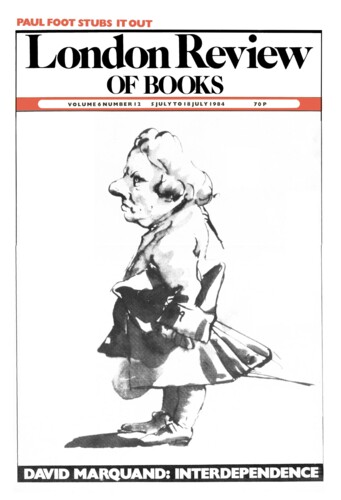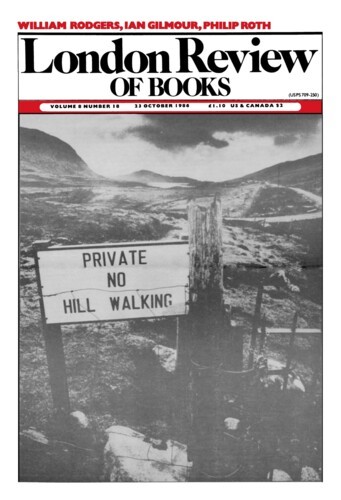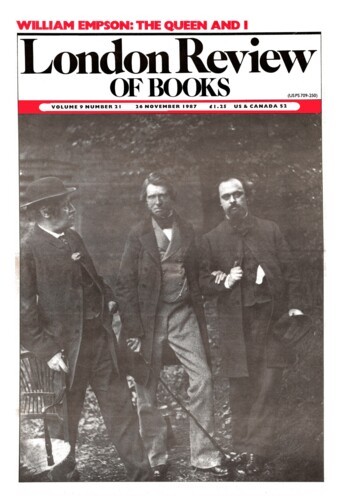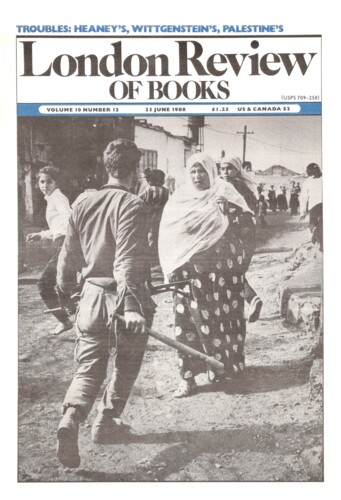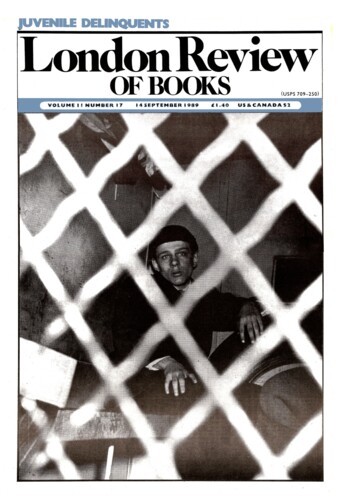Michael Brock
Michael Brock is the author of The Great Reform Act and co-editor, with Eleanor Brock, of H.H. Asquith: Letters to Venetia Stanley. He is Warden of Nuffield College, Oxford.
Did more mean worse?
Michael Brock, 23 October 1986
John Carswell is uniquely qualified to provide an official’s chronicle of British higher education in the Robbins and post-Robbins phases. He was assigned to the universities desk in the Treasury in 1960 when the Robbins Committee was being appointed. He left the secretaryship of the University Grants Committee for that of the British Academy in 1977. As his historical work on the 18th century has shown, he writes well. His Thoughts on the Present Discontents may not quite match Burke’s: but they are cleverly marshalled. His many insights are highly informative. His few in comprehensions could hardly be more revealing.
Did Lloyd George mean war?
Michael Brock, 26 November 1987
Bentley Gilbert is a historian well-equipped to strip off myths and expose facts. All his skills were needed here: during some seventeen years of ministerial life Lloyd George took a hand in five books about himself, and much distortion resulted. After the war, for instance, Ll.G. hoped that his long struggle against Naval expenditure had been forgotten. He recorded that in July 1908 he had told the German Ambassador of his willingness to borrow £100 million to maintain British naval supremacy. He did not record that in the same month he had blamed Britain for the naval arms race, telling a Queen’s Hall audience that the Dreadnoughts should not have been built. Other myths originated in Lloyd George’s tendency, especially when talking to an attractive young woman, to dramatise or improve on incidents in his past. He seems to have thought a spiritual crisis appropriate for a serious Welsh boy, especially for one who was later to exploit Nonconformist enthusiasm when himself an agnostic. He therefore gave arresting accounts of his spiritual torments on finding that ‘there was no one at the other end of the telephone.’ According to the careful estimate given here, there was some embroidery in these accounts.
Honest Graft
Michael Brock, 23 June 1988
Dr Searle began by investigating the radical right in Edwardian Britain. He soon decided that the accusations of corruption constantly made by its members deserved serious historical attention: they could not all be attributed to anti-semitism and ‘political paranoia’. This led him to widen the scope of his work until it comprehended the whole ‘plutocratic era’ from the 1890s ‘to about 1930’. It became his aim ‘to show the essential unity of a 35-year period … and to trace the connections between episodes … which combined to form … an intricate pattern of paranoia and suspicion’. He had to accept Walter Lippmann’s dictum. All that the historian ‘can really do’, this states, ‘is to write the history of the exposure of political corruption, in other words to describe and analyse political scandal’.
Ruthless Young Man
Michael Brock, 14 September 1989
A review of this book has to start with its tragic and complex history. The official Life of Churchill was originally to be in five volumes. Randolph Churchill died in 1968 when only the first two of these had been published. The Trustees of the Chartwell Papers then invited Martin Gilbert to complete this multi-volume work, and the second Earl of Birkenhead to complement it with a one-volume Life. While Martin Gilbert and his team were at work Lord Birkenhead was to be the only other person given access to the Chartwell Papers: his book was not to be published until the last of Gilbert’s volumes had appeared.
Pieces about Michael Brock in the LRB
Easy-Going Procrastinators: Margot Asquith’s War
Ferdinand Mount, 8 January 2015
The Prince was walking up and down in silence. He caught me by the hands and said: ‘Oh! say there is surely not going to be “warr” (pronouncing it like “far”). Dear,...
Prime Ministers’ Pets
Robert Blake, 10 January 1983
In reviewing the Gladstone Diaries and the Disraeli Letters I must declare an interest. I am chairman of the committee which superintends the publication of the former and one of the research...
Read anywhere with the London Review of Books app, available now from the App Store for Apple devices, Google Play for Android devices and Amazon for your Kindle Fire.
Sign up to our newsletter
For highlights from the latest issue, our archive and the blog, as well as news, events and exclusive promotions.
